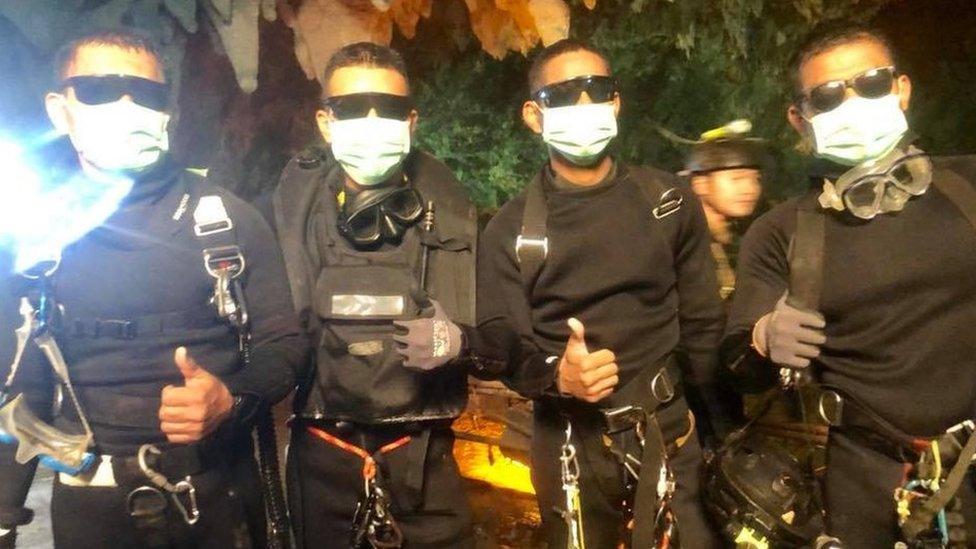Achieving the impossible: Thai cave rescue a year on
- Published
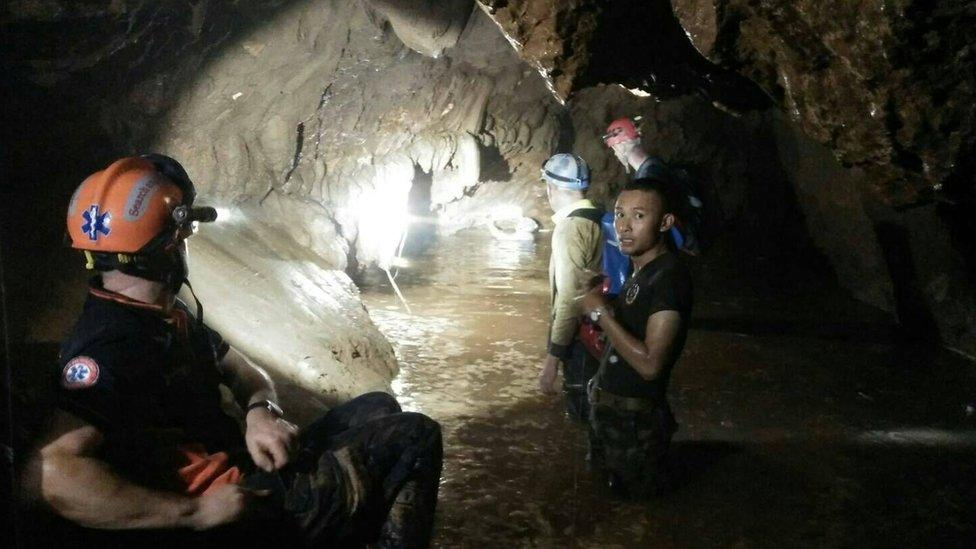
The world held its breath as the rescue team navigated through the flooded caves towards the trapped boys
For a moment, Vernon Unsworth almost cries. He stops talking, his eyes redden, he takes a deep breath, and reaches for his cup of tea.
Even now, a year after one of the most complex and dangerous rescues the world has ever seen, Vernon is still dealing with the trauma of those 17 desperate days.
The memory of the moment he heard 12 boys and their football coach had been found alive deep underground is almost too much. The relief - and the horror of what lay ahead - come flooding back.
"The real problems started from then," he told the BBC Beyond Today podcast.
"We knew where they were. It's a kilometre and a half of diving. How the hell were we going to get them out alive?"
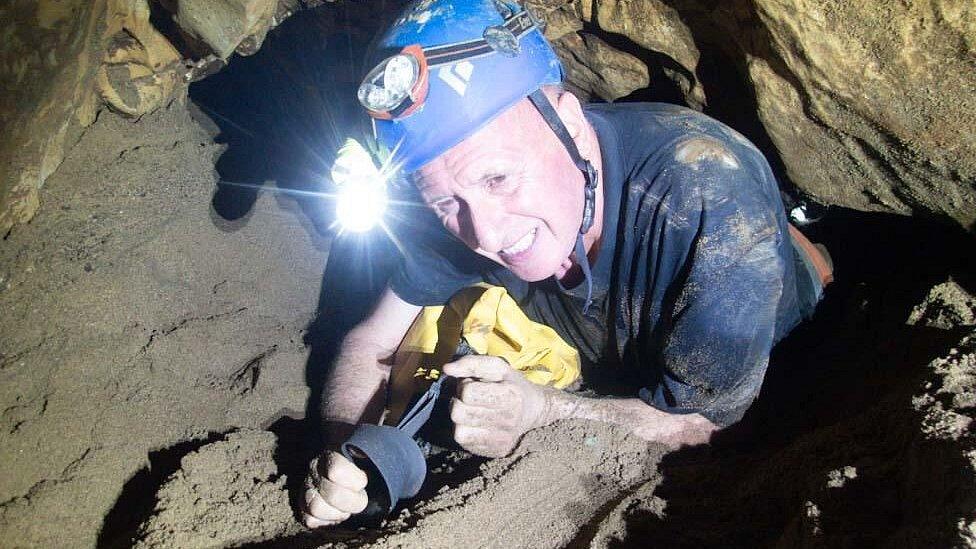
Vernon Unsworth in the Tham Luang caves
Vernon is a calm, measured man who deals well with pressure. He's been exploring underground caves for almost 50 years – a hobby that started in his native Lancashire when he was 16.
"The bug is finding a passage nobody's ever been into before - you know you're the first. Whatever footprints you leave, they're yours."
It's a hobby - not his job. But it's a pastime that made him one of just a handful of people in the world who could even attempt the impossible: saving the Wild Boars football team.
Trapped by a rising flood
The Wild Boars were a group of 12 boys aged 11 to 16.
On Saturday 23 June 2018, after their football training, they decided to head to the Tham Luang caves for a day trip, along with their 25-year-old coach.
It's a well-known local landmark and it wasn't unusual to go in at that time of year. Many like to see how far they can get into a system that runs for 10km (six miles).
Some of the boys had been before. This time, they decided they would all go in together.
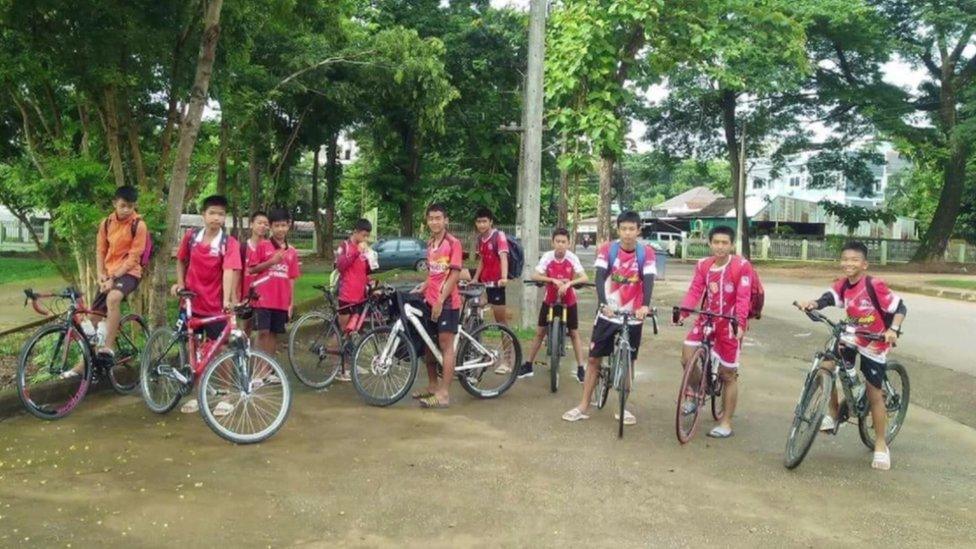
The boys posted this photo to Facebook shortly before they went into the cave
But the team got trapped by floodwater 4km (2.5 miles) inside – and that's when Thai officials called Vernon's phone, asking him to help out.
"I know it [the cave system] better than anybody. It's been my second home. I don't have to think about where I am," he says.
He drove to Tham Luang to meet officials and the local rescue team, but was stunned with what he found.
"[It was] organised chaos," he said.
"They didn't really know what to do, simply because they'd never had this situation arise before – especially involving 13 people trapped by rising floodwaters. But I knew because of the weather conditions that it was only going to get worse.
"I knew that this was going to end with someone losing their life."
Vernon took matters into his own hands. He wrote a list of the team he believed he needed for the rescue. It included Rob Harper, Rick Stanton, and John Volanthen - who were all in the UK. In an attempt to get the Britons involved, Vernon spoke to the former governor of the local province, Chiang Rai, a man named Narongsak Osatanakorn.
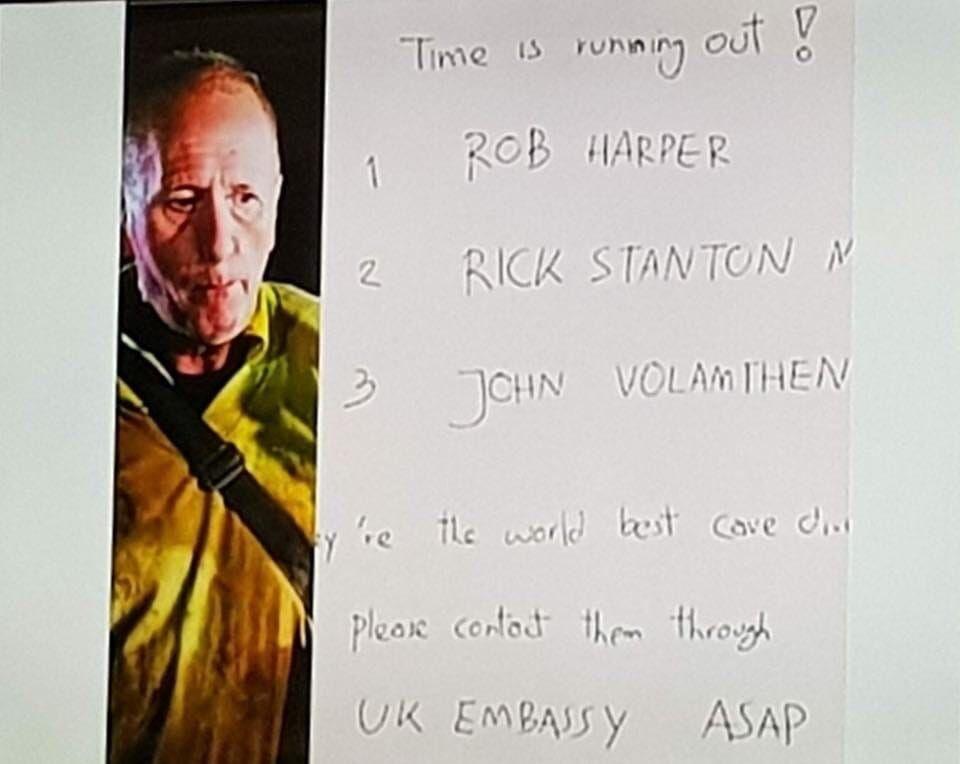
Vernon hastily scribbled out a list of potential team members

"I got him into a room and I basically said to him: Sir, you have one chance at this rescue."
To put the pressure on, Vernon met other government officials too.
That evening Rob, Rick and John were on a plane to Thailand.
'They thought they were finding bodies'
It was straight to work for the British divers.
On 28 June, in appalling weather conditions, John Volanthen and Rick Stanton went to the cave for an exploratory dive. To their disbelief, they found four Thai water management officials who had been trapped in there overnight.
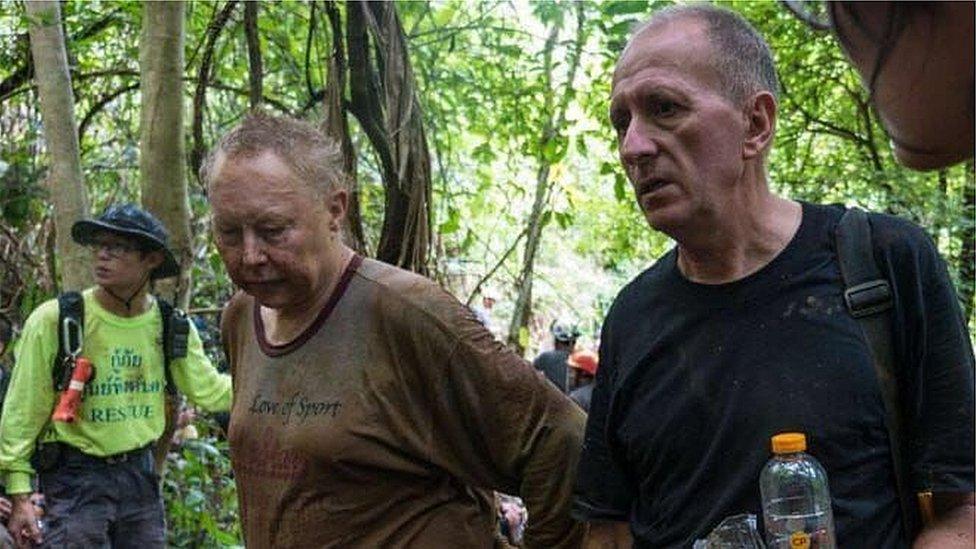
Rob Harper, left, was part of Vernon's hand-picked team
"Officials tried to basically ignore it ever happened because they didn't know the guys were in there. There was no logging of people going in. Nobody reported them as being lost or not around, not even their wives."
Governor Narongsak disputes this - he says he and other officials did know the four water officials were in the cave, and they had been told not to evacuate.
But the unexpected rescue was a blessing in disguise.
John and Rick had to dive the four officials out of the flooded caves. One of them had panicked during the rescue – and now Vernon and the team knew it would be impossible - if they were to find the boys - to dive them out of the cave without sedation.
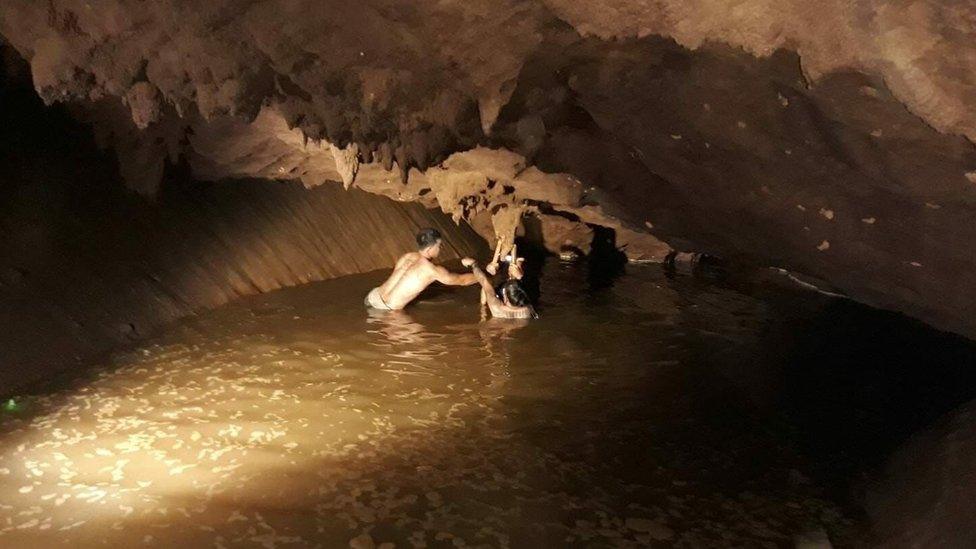
Conditions inside the cave on 28 June were treacherous
The search for the team started on 1 July, but it wasn't until the following day that they were discovered. Rick and John led the way.
"There was a horrible smell," Vernon remembers Rick telling him. "Rick thought it was dead bodies. It was faeces. They thought they were finding bodies."
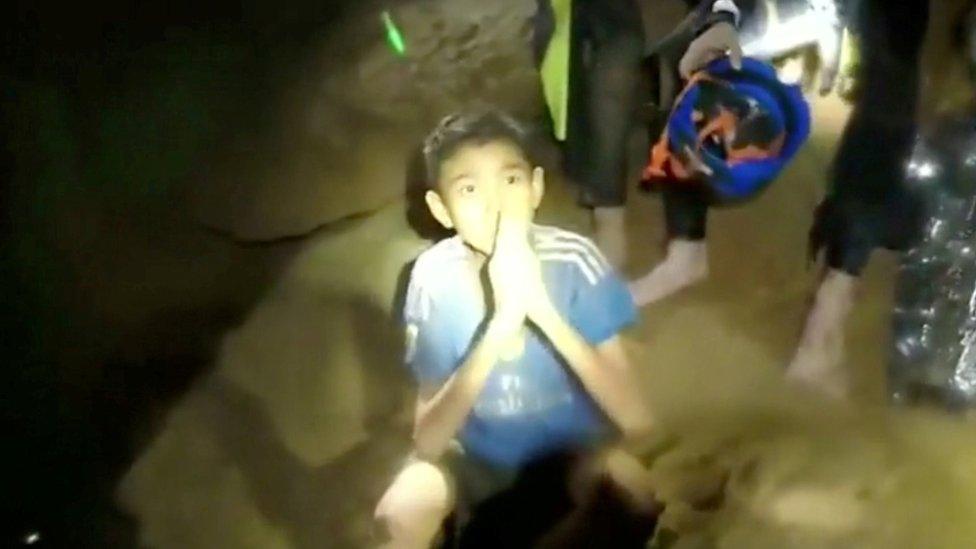
Divers were overjoyed to find the boys alive - but then had to co-ordinate their rescue
They'd found the team - but now they had to get them out.
'What if I decide not to do it?'
To the divers' knowledge, there are only three people in the world who are both elite cave divers and anaesthetists – one in the UK, one in the US, and one in Australia.
The British team got in touch with the Australian, Richard "Harry" Harris.
"Doc Harry said: 'It won't work'. He said 'it just won't work'," Vernon recalls.
"Rick said to Harry: 'Well I'd like you to sleep on it overnight', and Harry said to Rick: 'What if I decide not to do it?'"
"And Rick said: 'They all die'."

Richard Harris was almost on board.
First, though, he made sure that the Australian government negotiated with the Thai government to give him immunity in case anything went wrong.
For the others, British embassy officials were brought to Tham Luang to make sure they were also protected. And a plan was put together.
The only way they might get the boys out alive was to sedate them. They used a mixture of ketamine, xanax, and atropine to try to dry up fluids so they wouldn't choke on their own saliva.
The Wild Boars were knocked out. In some cases, they were barely breathing.
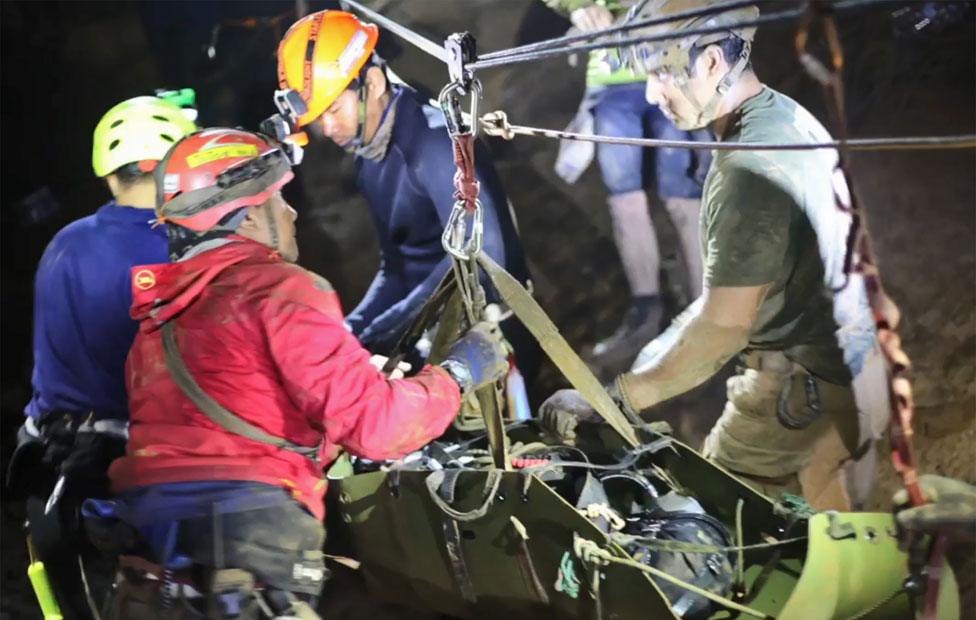
The boys were safely secured to a stretcher for the journey out
Each boy was given a full face mask, then packaged up - strapped to a kind of stretcher, tied hand and foot with cable ties.
The team set up a system of relays which the divers took them through - sometimes holding them close to their bodies, sometimes pushing them ahead, round the twisting s-bends of the caves. They even rigged up a pulley system on the roof of the cave and pulled them along.
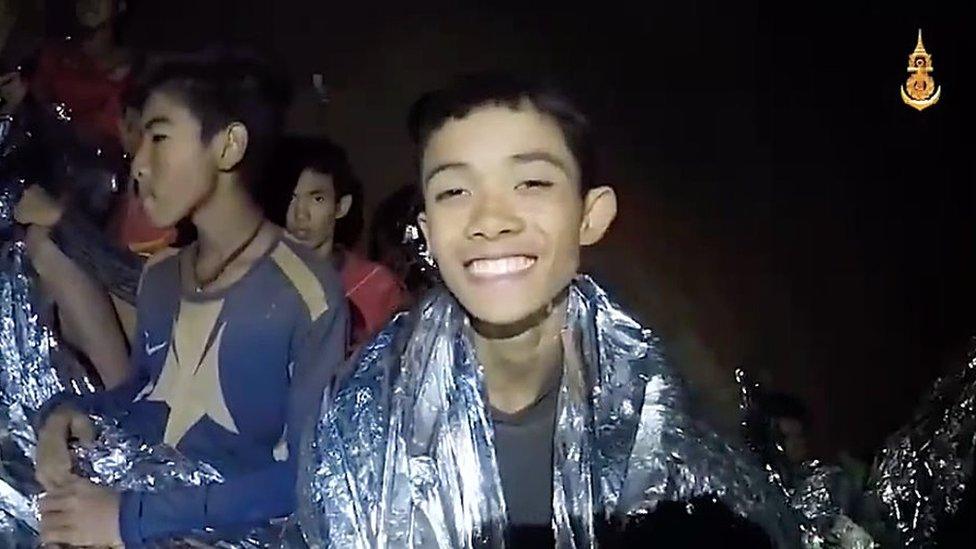
One by one the boys were brought to safety
Vernon remembers that two of the boys started to wake up during the rescue. "They were given a quick jab to get them unconscious (again)."
One by one, the boys were brought out.
"For us, it was a situation where four had miraculously come out alive, but we had to stay grounded - because it didn't mean that the next nine were going to come out alive," he says.
'None of us are heroes'
By the end of day two, eight of the boys were out. Four boys and their coach were still trapped.
And the conditions were getting worse.
"The rain that was forecast actually came earlier than we expected. It was 50/50 whether the dive went ahead on that morning."
But it did, just.
Families of the boys celebrated after finding out their loved ones were alive
"One of the divers lost his dive line whilst carrying one of the precious packages, but he made it out as well.
"And literally, after the last boy was on his way out of the cave, the floodwaters just suddenly started to come through.
"What was meant to be was meant to be," says Vernon.
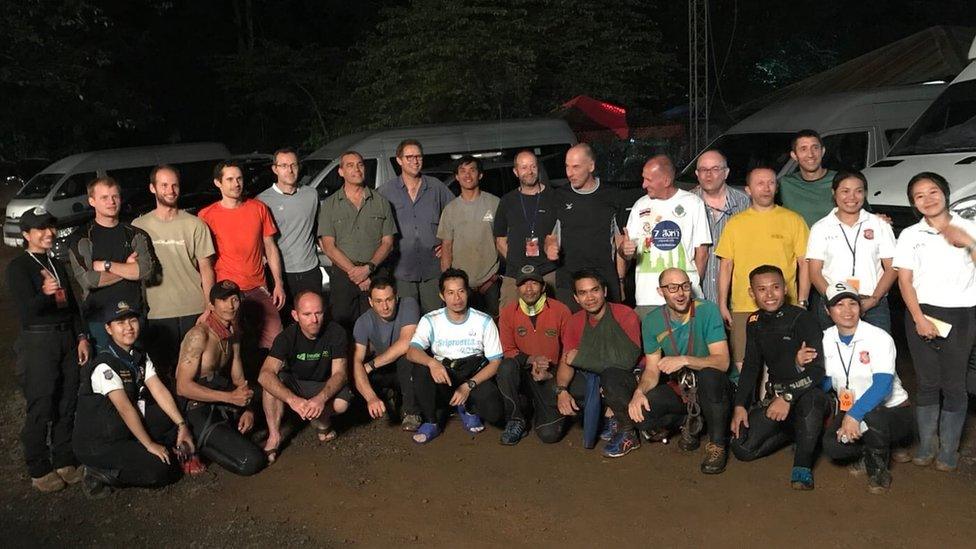
The rescue team could celebrate when all those trapped had been rescued
In Thailand, superstition and belief in mystical powers is prevalent. Lots of places across the country are said to have various powers, especially caves.
Tham Luang is associated with the myth of Nang Non, a princess who ran off with a lover and ended up taking her own life. She was supposedly pregnant with his child. The rivers inside the cave system are believed to be her blood.
Today, a year on, Tham Luang has become a tourist attraction. Many Thais stop and briefly pay their respects at the shrine there - only now it is not just to the princess, but to Saman Gunan, the one person who died.
He was a Thai diver who lost his life while delivering oxygen tanks just before they started the rescue effort.
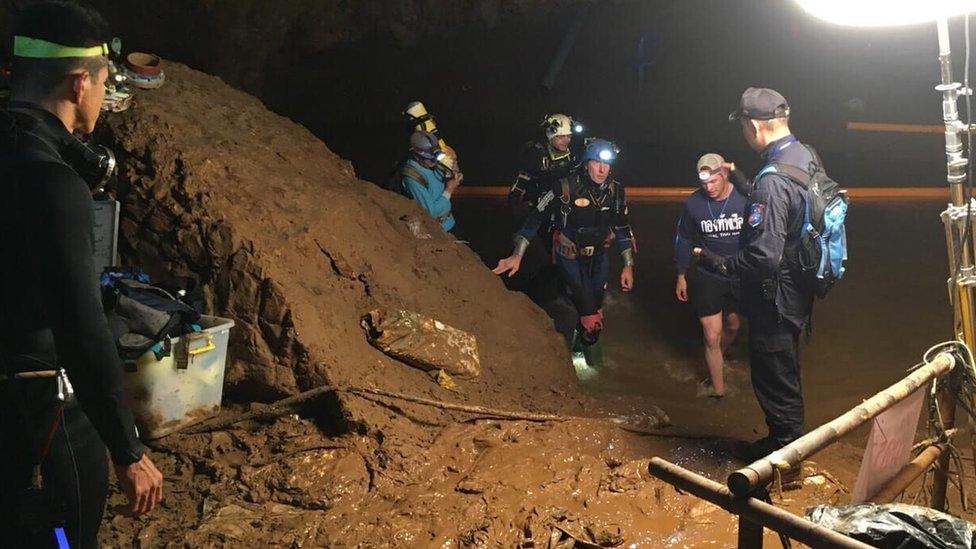
Saman Gunan, left, had been delivering oxygen tanks when he lost his life
A statue of Saman was unveiled outside the cave complex six months after the rescue, to commemorate him.
As for Vernon, he still spends a lot of his time in the area. He's been back inside the caves several times since the rescue.
For him, something has changed.
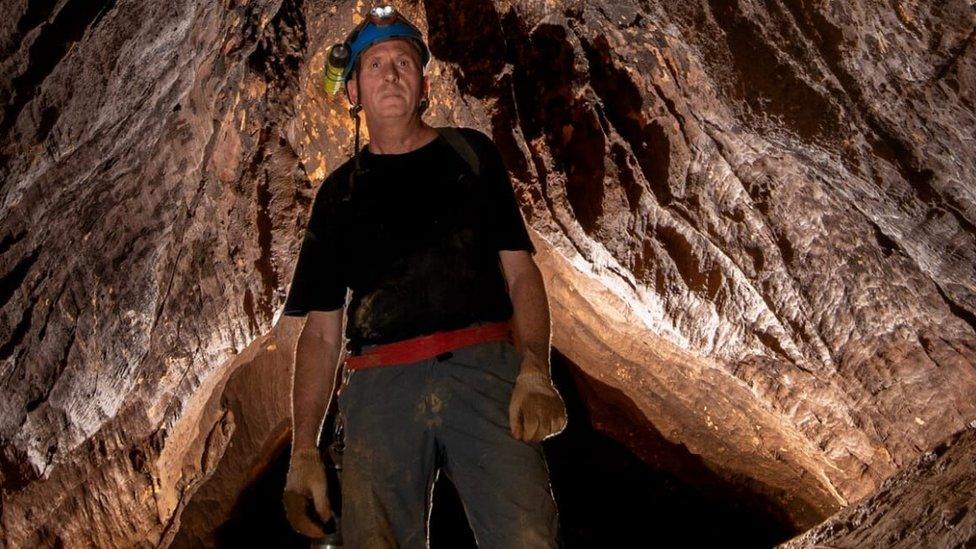
Vernon knows the cave system well
"Now before I go into the cave and when I come out I have a little prayer. I give her some flowers every time I go in now and when I come out I thank her for keeping me safe, which I've never ever done before. But it's just how I feel about the whole thing.
"None of us are heroes. We've just done a job that we were asked to do and we did it to the best of what we were able to do.
"It wasn't always easy but 13 isn't an unlucky number any more, is it?"
This episode of the Beyond Today podcast is available here.
- Published30 April 2019

- Published11 July 2018
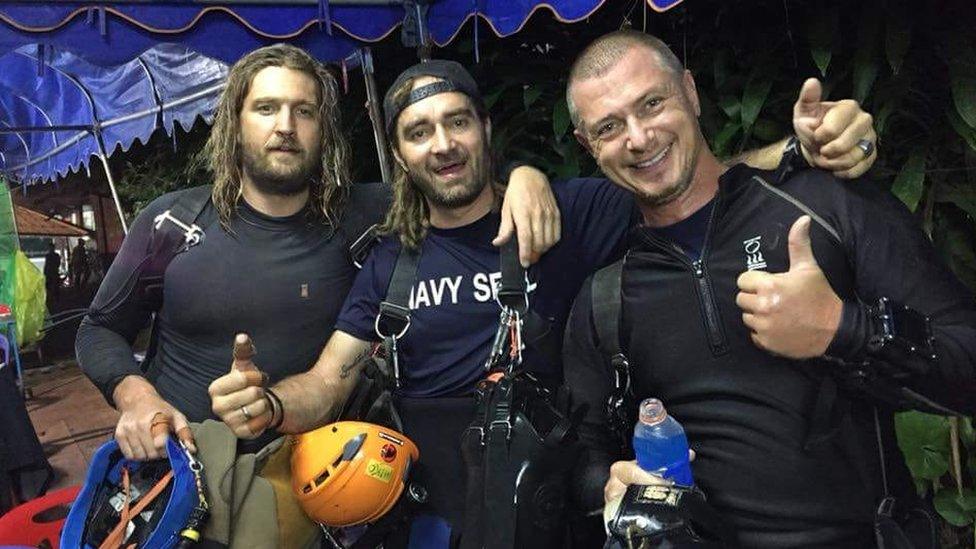
- Published13 July 2018
